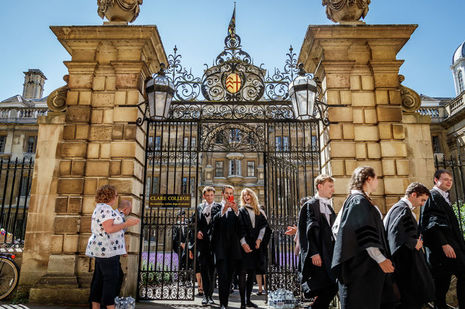Cambridge’s niche degrees make this university special
Engineers are everywhere but you won’t find many ASNaCs beyond Reality Checkpoint

I study Linguistics. So, which languages do I study? That’s the first question I tend to hear when I tell people what course I do. The answer is “none”. Linguistics is the study of language itself, and not of any specific one. You might want to think of it as “language sciences”. It is interdisciplinary enough that I study anatomy, physics, statistics, sociology, and coding, alongside more predictable topics, such as grammar, semantics, and language acquisition. Those are just my modules – other options in my course would have allowed me to explore psychology, history, or philosophy. Essentially, I do all of your degrees, and plenty of you don’t even know what mine is.
The same applies to other degrees: Land Economy; Education; Anglo-Saxon, Norse and Celtic; and more. Their students receive a lot of stick from people who don’t know what they actually do. There’s all the silly tropes about what careers these students will land themselves in. Linguists are apparently destined to be speech therapists, and theologians have a heavenly beckoning towards priesthood. Education students will be (you guessed it) teachers, and LandEcs will become estate agents, town council members, or farmers. ASNaCs will be unemployed.
“I do all of your degrees, and plenty of you don’t even know what mine is”
Sorry, ASNaCs – I couldn’t help myself. This piece isn’t a rant about the jokes that get made about these degrees, at all. Rather, I want to embrace the quirkiness of these courses, which are – in some cases – unique to Cambridge. I couldn’t tell you three facts about the Vikings, but there are students who could ramble for hours about them. That’s not something that you find at other universities, and means that we have the added privilege of being able to learn about these oddities from one another.
If you want to study one of these niche degrees, Cambridge is often your only choice. So you have no choice but to work really hard in your field of choice, like everyone who studies here does. Eventually, you specialise in a niche area, and become the best at it, because no one is doing it anywhere else – certainly not in the same depth. This gives you such a unique advantage, or perspective, or ability, or whatever you’re looking to gain from the study of that degree.
Am I verging into making a case for these degrees being the best ones? Perhaps, actually. On top of all of the previous benefits, they do appear to have fewer work hours, but still enter the same depth, if not more, than other degrees, because they are indeed so niche. And they’re more fun, at least for the students doing them. To study ASNaC, you really have to possess a passion for a specific type of medieval history. By contrast, an Economics student might have settled on their degree because they are good at maths and like the idea of lots of money. Note the emphasis on “might” – of course, there are also some Econs who are very passionate about Economics. But that same spark isn’t always present.
Are these niche degrees less employable, as the jokes from earlier suggest? Well, 95% of Land Economists are in employment and/or continuing their studies 15 months after they finish their course, more than NatScis (89%), Mathmos (88%), or Historians (87%). In fact, the current master of St John’s College, also the first female master of the College, read LandEc there a few decades ago. Linguistics students received the highest proportion of first class grades in 2020/21, and are rumoured to be the MI5’s top targets for trainee spies (not speaking from personal experience – although if I was, I wouldn’t exactly admit it). It doesn’t appear to be the case that these degrees hinder employability.
So, the next time your NatSci friend is taking the mickey out of your niche degree, send them here. Remind them that you are passionate about your degree, employable, and have time for hobbies such as leaving your room or having a social life. Here’s to the niche degrees – Cambridge wouldn’t be the same without them.
 News / Caius mourns its tree-mendous loss23 December 2025
News / Caius mourns its tree-mendous loss23 December 2025 Comment / Yes, I’m brown – but I have more important things to say22 December 2025
Comment / Yes, I’m brown – but I have more important things to say22 December 2025 Interviews / Politics, your own way: Tilly Middlehurst on speaking out21 December 2025
Interviews / Politics, your own way: Tilly Middlehurst on speaking out21 December 2025 News / King appoints Peterhouse chaplain to Westminster Abbey22 December 2025
News / King appoints Peterhouse chaplain to Westminster Abbey22 December 2025 News / Clare Hall spent over £500k opposing busway 24 December 2025
News / Clare Hall spent over £500k opposing busway 24 December 2025









